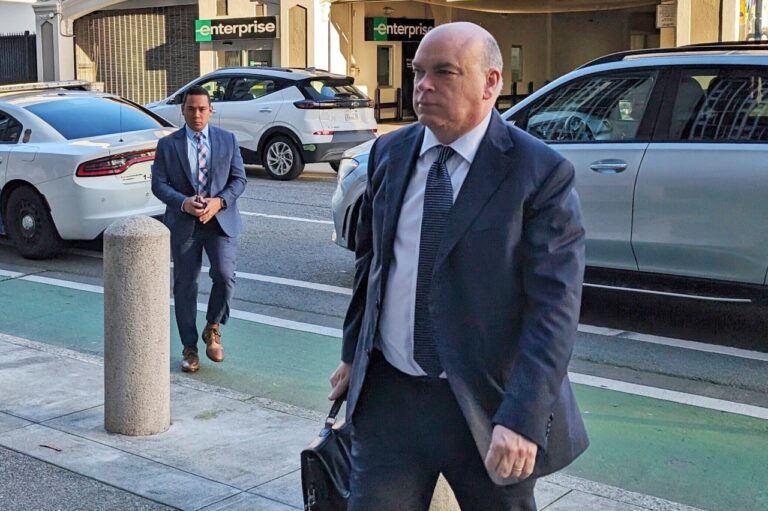Michael Liedtke, The Associated Press
2 minutes ago

FILE – Former British tech star Mike Lynch walks into a federal court in San Francisco for a new day in his criminal trial accused of defrauding Hewlett-Packard Co. in its $11 billion acquisition of software maker Autonomy, March 26, 2024. On Thursday, June 6, Lynch, once hailed as Britain’s tech king, was acquitted of charges that he orchestrated the fraud and conspiracy that led to the $11 billion deal that proved a costly burden for Silicon Valley pioneer Hewlett-Packard Co. (AP Photo/Michael Liedtke, File)
SAN FRANCISCO (AP) — Mike Lynch, once hailed as Britain’s technology magnate, has been acquitted of fraud and conspiracy charges that led to an $11 billion deal that was a major blow to Silicon Valley pioneer Hewlett-Packard Co.
The not guilty verdict handed down by a jury in federal court in San Francisco on Thursday was the result of an 11-week criminal trial that delved into HP’s 2011 acquisition of Autonomy, the business software company that Lynch founded and later oversaw as CEO in the United Kingdom. HP initially celebrated the acquisition as a major coup that put the Palo Alto, California, company on a promising new path, but soon came to regret it under then-CEO Meg Whitman’s stewardship.
The jury acquitted Lynch of all 15 felony charges. Late in the trial, U.S. District Judge Charles Breyer dismissed securities fraud charges that had been included in the U.S. Department of Justice indictment against Lynch dating back to 2018. It took years for Lynch to be extradited from the UK, and subsequent legal battles followed, before her trial finally began in mid-March.
Lynch, 58, was free on $100 million bail. The massive fraud indictment marked a dramatic turn of events for the entrepreneur once known as Britain’s Bill Gates. After negotiating the sale of Autonomy for more than $800 million, Lynch seemed worthy of the title.
The acquittal vindicates Lynch, who for years vehemently denied he did anything wrong while portraying HP as a technology disaster. It’s another setback for HP, which has long accused Lynch of misleading HP into making deals that deepened its troubles and tarnished the company’s legacy dating back to its founding in a Silicon Valley garage in 1939.
In a statement, Lynch said he was elated by the verdict and thanked the jury for carefully examining the facts of a complex case.
“I’m looking forward to returning to the UK and enjoying what I love most – my family and innovating in my field,” Lynch said.
The Justice Department did not immediately respond to a request for comment.
Stephen Chamberlain, Autonomy’s former financial officer, was charged with fraud alongside Lynch in the complicated trial, and the same jury acquitted Chamberlain of charges.
After prosecutors called more than 30 witnesses to the stand to support their case, Lynch testified in his own defence over several days last month, explaining various variations on the British idiom, sometimes speaking directly to the jury.
Lynch, like his own lawyers, maintains that he did nothing wrong and that Whitman has unfairly made him and Autonomy scapegoats for HP’s mismanagement and deteriorating financial situation.
Mr. Whitman, who became HP’s CEO after an unsuccessful 2010 run for California governor, realized an $8.8 billion loss on the Autonomy deal and fired Mr. Lynch in 2012 for allegedly manipulating the books. He also laid off thousands of employees as HP’s performance deteriorated and eventually split the company in two, separating its PC and printer businesses from the products and services it sold to other companies.
Whitman was not called to testify, but the trial examined HP’s decline under his leadership. Another former HP CEO, Leo Apotheker, who negotiated the Autonomy deal, was also called by federal prosecutors to brief them on Lynch’s alleged misconduct.
Apotheker initially positioned Autonomy as a key part of HP’s plan to reduce its reliance on selling PCs and printers with the advent of smartphones. According to evidence presented at trial, HP valued Autonomy internally at $46 billion, primarily because it developed software that would help other businesses quickly find valuable information buried in emails and other digital documents.
Federal prosecutors have portrayed Lynch as an overbearing and corrupt boss during his 16-year tenure as CEO of Autonomy, while his lawyers have portrayed him as a typical tech geek who liked to eat cold pizza late at night while brainstorming potentially lucrative ideas.

